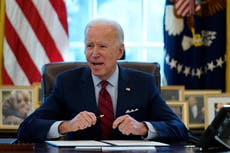Democrats take first big step to ram through Biden’s $1.9trn Covid-relief plan
Democrats would ‘welcome Republican input’, Schumer says
Your support helps us to tell the story
From reproductive rights to climate change to Big Tech, The Independent is on the ground when the story is developing. Whether it's investigating the financials of Elon Musk's pro-Trump PAC or producing our latest documentary, 'The A Word', which shines a light on the American women fighting for reproductive rights, we know how important it is to parse out the facts from the messaging.
At such a critical moment in US history, we need reporters on the ground. Your donation allows us to keep sending journalists to speak to both sides of the story.
The Independent is trusted by Americans across the entire political spectrum. And unlike many other quality news outlets, we choose not to lock Americans out of our reporting and analysis with paywalls. We believe quality journalism should be available to everyone, paid for by those who can afford it.
Your support makes all the difference.Speaker Nancy Pelosi and Senate Majority Leader Chuck Schumer have taken the first massive step towards passing President Joe Biden’s $1.9trn Covid relief package on a party-line basis.
The pair of Democratic leaders filed what is known as a “joint budget resolution” on Monday that will provide a legislative vehicle for negotiators from each chamber to sidestep Republican opposition in the Senate, which usually requires 60 votes to end a filibuster attempt and pass legislation.
With 50 Democratic (or Democratic-caucusing) senators plus Vice President Kamala Harris ready to cast a tiebreaker vote, Mr Schumer likely has the votes to send the final product to the Oval Office for Mr Biden’s signature.
Mr Schumer and Ms Pelosi filed the joint budget resolution less than two hours before a group of 10 Republicans senators was scheduled to meet with Mr Biden on Monday afternoon to discuss a path forward on a potential bipartisan deal. That group of 10 Republicans, led by Senator Susan Collins of Maine, has outlined a proposal worth $618bn, less than a third of the value of Mr Biden’s package.
“Congress has a responsibility to quickly deliver immediate comprehensive relief to the American people hurting from Covid-19,” Mr Schumer and Ms Pelosi said in a joint statement on Monday. “The cost of inaction is high and growing, and the time for decisive action is now.”
The Democratic leaders said they remain “hopeful that Republicans will work in a bipartisan manner to support assistance for their communities”.
But, they added, “the American people cannot afford any more delays and the Congress must act to prevent more needless suffering”.
While there is certain to be hand-wringing from Republicans about the partisan legislative process Mr Schumer and Ms Pelosi are prepared to use to pass another monumental outlay of government spending, the GOP used the same process in 2017 for their massive tax code overhaul that was estimated to add between $1trn and $2trn to the federal deficit over a 10-year period.
If the House and Senate both pass the joint budget resolution this week (the Democratic majorities should have the votes), that will trigger a negotiation period between the sibling committees from each chamber, which will meet to carve out the final “reconciliation bill” within the parameters laid out in the original budget resolution.
Mr Schumer and Ms Pelosi’s resolution filed on Monday provides a roadmap for the final contours of a partisan Democratic bill:
- $1,400 stimulus checks for individual taxpayers as well as $1,400 per child;
- a federal supplement of $400 per week for Americans receiving state unemployment benefits, lasting through September;
- $350bn in aid to state, local, tribal, and territorial governments.
The joint resolution also provides billions of dollars in funding to help re-open in-person classes at K-12 schools, colleges and universities, ramp-up testing across the country, and boost the national vaccine distribution programme, among dozens of other provisions.
Republicans’ $618bn proposal does not include any emergency relief aid for state and local governments, and has narrower outlays for stimulus checks and the federal unemployment supplement.
Mr Schumer on Monday said he would “welcome Republican input” on the final reconciliation bill.
“There is nothing in this process that will preclude it from being bipartisan,” the majority leader said.
But he added that he and the Democratic committee leaders would shut down GOP proposals to drastically curtail the bill’s scope, saying he and other progressives had learned hard lessons about Republicans insisting on “bipartisanship” as a guise for obstructing Barack Obama’s agenda to jolt the recession economy in 2009.
“The only thing we cannot accept is a package that is too small or too narrow to pull our country out of this emergency. We cannot repeat the mistake of 2009. And we must act very soon to get this assistance to those so desperately in need,” Mr Schumer said on Monday.




Join our commenting forum
Join thought-provoking conversations, follow other Independent readers and see their replies
Comments